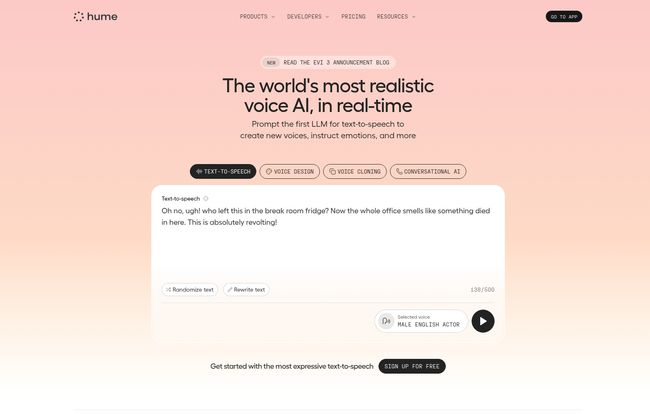We’ve all been there. You’re on the phone with your bank, trying to dispute a charge, and you’re forced to talk to a robot. “I… did… not… understand… that,” it chirps, with all the emotional range of a toaster. You find yourself shouting “REPRESENTATIVE” into the void, your blood pressure climbing. It's frustrating. It feels like technology, for all its advances, still fundamentally misunderstands us.
For years, the gold standard for AI voice was just… clarity. Could it pronounce words correctly? Great. Could it read a script without sounding like it’s running out of batteries? Fantastic. But emotion? Nuance? The subtle stuff that makes a conversation feel, well, human? That’s always been the missing piece of the puzzle.
Until now, maybe. I’ve been keeping an eye on a company called Hume AI, and what they’re doing is, frankly, pretty mind-blowing. They're not just building another text-to-speech (TTS) engine. They’re a research lab on a mission to build AI grounded in human well-being, starting with what they call “empathic AI.” And I think they might actually be on to something big.
So, What Exactly is Hume AI?
First off, let's get one thing straight. Hume isn’t just another voice generator you feed a script to. They position themselves as a research lab building foundation models with a conscience. Their entire philosophy is built around creating AI that can understand and respond to human emotional expression. Think of it like this: most AI assistants are like actors who can only read their lines. Hume AI is trying to build an actor that understands the entire emotional arc of the scene and can improvise accordingly.
This isn't just about making customer service bots sound a little less soulless. It's about fundamentally changing how we interact with technology. It's about creating applications that can offer genuine companionship, provide more intuitive mental health support, or design game characters that react to your excitement or frustration in real-time. It’s a huge shift in thinking.
The Tech That Makes You Feel Something: EVI and Octave
So how do they do it? The magic seems to be in their two flagship products: The Empathic Voice Interface (EVI) and Octave TTS.
EVI: The Empathic Voice Interface That Actually Listens
EVI is their conversational AI. You can talk to it, and it talks back. But the crazy part is its ability to understand the tone of your voice and then generate a response with an appropriate, emotionally-aware tone of its own. It's designed for fluent, real-time conversations. The demos are wild—it can pick up on subtle cues, laugh along with you, or adopt a more serious tone if it senses a change in your mood. It feels less like a command-and-response system and more like a real dialogue.
This is where the potential really starts to spark my imagination. Think of accessibility tools for those who struggle with social cues, or educational software that can sense a child’s frustration and offer encouragement. It's pretty profound stuff.

Visit Hume AI
Octave TTS: Your Words, but with Soul
Then there's Octave, their text-to-speech model. This isn’t your average TTS. Hume calls it the first LLM for text-to-speech, which means it understands context. It doesn't just read words; it comprehends the meaning behind them to predict the most natural emotional delivery. Even better, you can guide it with simple prompts. Instead of fiddling with dozens of sliders for pitch and speed, you can just tell it, “Read this like you’re sharing a secret,” or “Make it sound a bit more upbeat.” It’s an intuitive, almost artistic way to direct an AI voice.
And you can create any voice you want from a simple prompt. No need for hours of voice actor recordings. You could describe a voice as “warm and gravelly, like an old storyteller” and it will generate it. The creative possibilities for podcasters, animators, and developers are just immense.
Let's Talk Money: The Hume AI Pricing Breakdown
Okay, the tech is cool. Very cool. But as a business owner and someone who keeps a close eye on CPC and ROI, I know the next question is always: “What’s it going to cost me?” I've got to say, their pricing structure is surprisingly accessible.
Hume has a tiered system that seems designed to scale with you. Here's a quick look at their plans for Text-to-Speech and their EVI model:
| Plan | Monthly Cost | TTS Characters | EVI 3 Minutes | My Take |
|---|---|---|---|---|
| Free | $0 | 10,000 | 5 | Perfect for dipping your toes in. Enough to test and build a proof-of-concept. |
| Starter | $99 | 30,000 | 40 | Great for indie developers or a small-scale project. |
| Creator | $199 | 140,000 | 200 | For when you're getting serious traffic or have a content-heavy app. |
| Pro | $499 | 1,000,000 | 1,200 | Serious production use for established applications. |
| Scale & Business | $1499+ | 3.3M+ | 5,000+ | This is for the big leagues, high-volume commercial use. |
| Enterprise | Custom | Custom | Custom | If you're a major corporation, you'll be talking to their sales team. |
They also have a separate pay-as-you-go pricing for their Expression Measurement API, which lets you analyze emotion in video, audio, and text. It's a powerful tool for researchers and companies doing deep user analysis.
Why This Matters More Than You Think
I've been in the SEO and traffic generation game for years, and I've seen trends come and go. But this feels different. This isn’t just a new tool; it’s a new category. For so long, we’ve optimized for clicks and keywords, often at the expense of user experience. We create content that machines will rank, not necessarily what humans will love.
Empathic AI could flip that script. Imagine a website that adapts its tone based on user behavior. Or an e-commerce assistant that can sense a customer’s hesitation and offer help in a reassuring way, not a pushy one. The impact on engagement, conversion rates, and brand loyalty could be massive.
Of course, there's a flip side. The ethical considerations are huge. The idea of an AI that can not only understand but also manipulate human emotion is something straight out of sci-fi. It’s a conversation we need to have. I appreciate that Hume AI seems to be taking this seriously with their focus on “human well-being” and The Hume Initiative. This isn't just tech for tech's sake; there's a philosophy behind it. But it's on all of us, teh developers and marketers, to use these tools responsibly.
A Few Lingering Questions (FAQ)
Can Hume AI understand different languages?
Right now, its primary focus is English, but they mention “emergent multilingual capabilities” in their documentation for EVI. This suggests that as the model gets smarter, it’s starting to pick up on other languages organically. I'd expect more formal support for other languages down the line.
Is Hume AI difficult for developers to use?
From what I've seen, they've put a lot of effort into making it accessible. They provide a full developer platform, extensive documentation, and a community for support. With a generous free tier, there's a low barrier to entry for any developer who wants to experiment.
How does Hume AI create custom voices?
With their Octave Voice Design feature, you can generate a unique AI voice using just a text prompt or by providing a script with an evocative description. This is a huge departure from older methods that required tons of audio data from a single speaker.
What is the 'Expression Measurement API' for?
This is a tool for analysis. It can take an input—like a video of a user testing a product, a customer service call, or text from a review—and measure the emotional expressions it detects. It's for understanding how people are reacting to something on a granular level.
Is Hume AI's emotional intelligence actually… intelligent?
That’s the million-dollar question, isn’t it? In my opinion, it's a very sophisticated form of pattern recognition. It’s been trained on vast amounts of data to associate certain vocal patterns with certain emotions. Is it 'feeling' anything? No. But can it produce a response that is indistinguishable from genuine empathy to a human user? It's getting alarmingly close.
My Final Thoughts on Hume AI
I'm genuinely excited by what Hume AI is building. It feels like a step-change, a move away from purely functional AI toward something more relational. For years, we’ve been trying to teach humans how to talk to computers. Now, it feels like we’re finally teaching computers how to talk to humans—with all the messiness, warmth, and nuance that entails.
It’s not perfect, and the ethical road ahead is one we'll have to navigate carefully. But the potential to create more helpful, engaging, and fundamentally human technology is undeniable. I’ll be keeping a very close eye on them, and I suggest you do too. This could be the start of a whole new chapter in our relationship with the digital world.
Reference and Sources
- Hume AI Official Website
- Hume AI Pricing Page
- 'Building ethical AI is everyone’s business. Here’s why' - World Economic Forum



